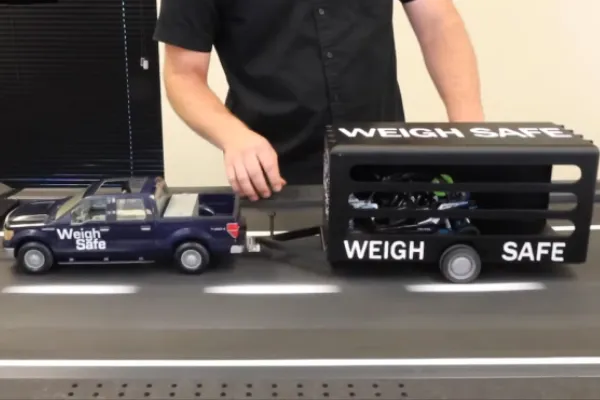Towing weight is essential when hitting the road with a trailer in tow. You need to know whether you’re towing too much weight before you embark on your journey to ensure your safety and the safety of others.
Identifying if you’re towing too much weight involves keenly observing your vehicle’s behavior. Reduced steering responsiveness, struggling to maintain a straight path, and longer braking distances can indicate an overloaded tow.
If your engine works hard on inclines or your transmission overheats frequently, you might tow beyond capacity.
We’ll talk about how to determine if you are towing too much weight and explain the consequences of towing too much weight.
How Do You Know if You Are Towing Too Much Weight: 7 Signs to Look Out For

There are several key factors to consider to determine if you are towing too much weight. These are:
- Gross vehicle weight rating (GVWR)
- Tongue weight
- Handling and steering
- Braking performance
- Acceleration and power
- Transmission overheating
- Suspension compression
Let’s discuss the signs in detail, so you can determine whether you are towing an excessive amount of weight.
1. Gross Vehicle Weight Rating (GVWR)
To determine whether you are towing too much weight, you should check the GVWR of your vehicle.
The Gross Vehicle Weight Rating (GVWR) is the maximum weight that your vehicle can safely carry, including passengers, cargo, and trailer tongue weight.
Check your vehicle’s owner’s manual, the driver’s side door frame, or the manufacturer’s website to find your vehicle model’s GVWR.
It is crucial to stay within this limit to ensure optimal safety and performance while towing. Exceeding the GVWR can excessively strain your vehicle’s components and compromise its handling capabilities.
When you need to move a heavy load beyond the capacity of your vehicle, then the best thing you can do is hire a reputable Santa Clara towing company. Regardless of the weight of your load, they have heavy-duty tow trucks that can assist you in moving it.
2. Tongue Weight
Tongue weight is crucial because if it’s too heavy, you might be towing too much weight, leading to instability and difficulty in controlling your vehicle. Ensure the tongue weight falls within the recommended range of 10-15% of the trailer’s total weight to ensure safe towing.
On the other hand, if the tongue weight is too light, it can cause swaying and an increased risk of fishtailing.
3. Handling and Steering
If the steering of your towing vehicle becomes less responsive, you may be putting too much weight on it. Maintaining proper weight distribution ensures optimal handling and steering while towing.
When towing too much weight, you may notice a decrease in steering responsiveness, difficulty maintaining a straight path, or excessive swaying.
These signs indicate that the weight is not properly distributed, putting strain on your vehicle’s suspension and compromising its stability.
To avoid these issues, ensure that your load is evenly distributed between your towing vehicle’s front and rear axles. A heavy-duty tow truck is required for large loads.
4. Braking Performance
If your vehicle’s braking distance increases significantly while towing, it’s a strong indicator that you might be overloading your brakes.
When towing, the additional weight puts extra strain on your braking system. If the load exceeds the capacity of your brakes, they will struggle to slow down or stop the vehicle effectively.
This can lead to longer braking distances and an increased risk of accidents. To ensure safe towing, always check the maximum towing capacity of your vehicle and stay within its limits.
5. Acceleration and Power
If your vehicle struggles to accelerate or maintain a consistent speed, especially on inclines, this may indicate excessive towing weight straining the engine.
This can negatively impact your overall towing experience and potentially damage the engine. You can increase your vehicle’s towing capability and overall stability and safety by installing a tow package.
6. Transmission Overheating
Excessive towing weight can cause your vehicle’s transmission to overheat, potentially leading to damage.
When you tow too much weight, the transmission has to work harder than it’s designed for, generating excessive heat.
This heat can break down the transmission fluid, causing it to lose its lubricating properties and increase friction and wear on internal components. Over time, this can result in transmission failure and costly repairs.
7. Suspension Compression
When your vehicle’s suspension compresses excessively, it can cause noticeable sagging in the rear. This indicates that you may be towing too much weight for your vehicle to handle.
Excessive compression strains the suspension system, leading to reduced stability and control.
What’s the margin of safety for the maximum tow rating?

The margin of safety for the maximum tow rating is typically recommended to be around 10%. This safety margin is advised to account for variables such as the weight of passengers, fuel, and cargo that might be present in the vehicle while towing.
By subtracting 10% from the listed towing capacity, one can help ensure a safer and more controlled towing experience, reducing the risk of overloading the vehicle and compromising its stability and performance.
This precautionary measure considers potential weight fluctuations and unexpected conditions on the road, contributing to a more reliable and secure towing operation.
Where should the weight be when towing?
When towing a trailer, the recommended distribution of weight is to place 60% of the load in front of the axle and 40% behind it. This principle holds true when dealing with a single-axle, double-axle, or triple-axle trailer.
By adhering to the 60/40 rule, you help maintain proper balance and stability in the towing setup. Placing the majority of the weight in front of the axle ensures better control over the trailer, preventing potential swaying or fishtailing while on the road.
Having some weight behind the axle provides adequate support and prevents the trailer from becoming too nose-heavy. Following this rule contributes to a safer and more controlled towing experience.
Safely And Efficiently Tow Your Loads and Take Care of Your Vehicle
It’s crucial to be aware of the excessive weight indication signs while towing. Ignoring these signs can lead to serious consequences. This includes damage to your vehicle’s engine and transmission, as well as accidents on the road.
By monitoring factors like vehicle strain, braking ability, and steering control, you can ensure a safe and efficient towing experience.
Always consult your vehicle’s manual and adhere to its recommended towing capacity to avoid any potential risks or hazards.
